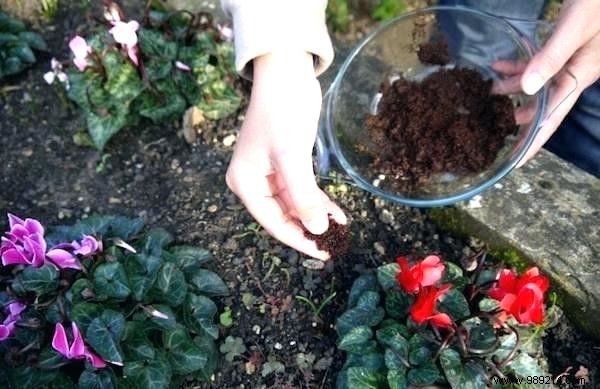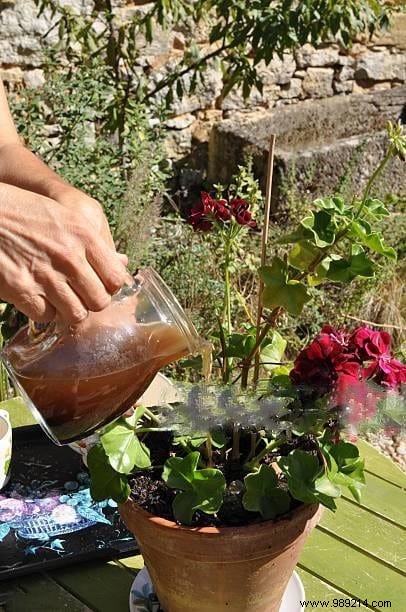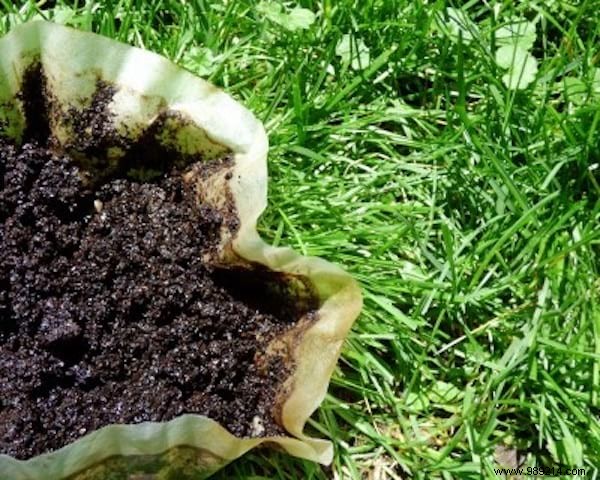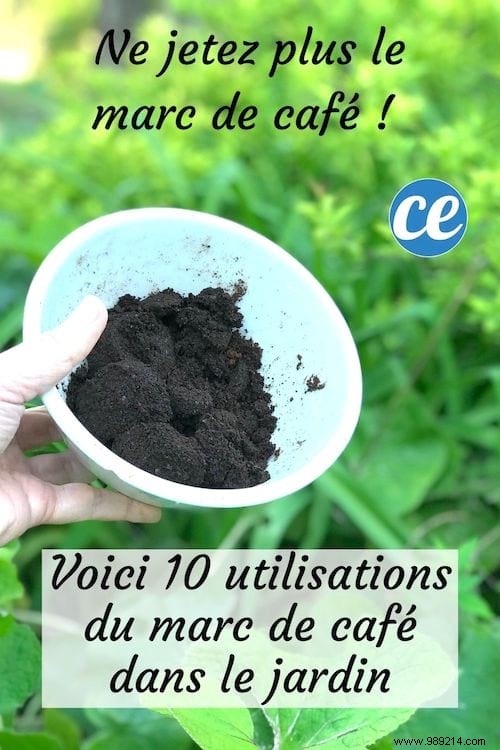
It's hard to imagine my day without a cup of coffee... or several cups;)
Its smell, its warmth and the caffeine...
It's definitely my favorite boost and my ally every morning.
I'm sure you know what I'm talking about!
If you are a coffee lover, you pass it yourself every morning.
But what about the leftover coffee grounds? Don't tell me you're throwing it away?!
Coffee grounds have a lot to offer your garden. And it's free!
Here are 10 ideas for recycling your coffee in the garden . Watch:

Add the coffee grounds directly to your compost. It is an excellent source of nitrogen.
Remember that your compost should be balanced between high nitrogen and high carbon ingredients such as sawdust, twigs or dried leaves.
If the compost begins to produce a slight odor, this is a sign that you have too much nitrogen and not enough carbon.
So don't overdo the coffee grounds in the compost!

Leaf mulch uses nitrogen from the soil as it breaks down.
This means that there is a decrease in the level of nitrogen available to plants.
Adding coffee grounds is the solution to compensate for this loss.
Organisms in the soil will break down the coffee grounds faster than the mulch, providing additional nitrogen for the breakdown of the mulch itself.

If slugs feast on your vegetables in the spring, use coffee grounds to scare them away.
Indeed, slugs hate crossing a barrier of coffee grounds because of their smooth and slimy skin.
If you're battling slugs in your garden and you have coffee grounds, you should be able to fix the problem naturally!
To do this, sprinkle it in a circle around your plant. Reapply as needed after rain.

Due to its high nitrogen content, adding too much coffee grounds to already loamy soil is not recommended.
But, if you have soil that needs nutrient enrichment and drainage, coffee grounds are just the thing for you.
In fact, coffee grounds are an excellent source of food for earthworms, which help aerate the soil in the vegetable garden.
They carry coffee grounds deep into the earth, which adds nutrients and improves soil structure.

If you don't have enough space for a compost, you may have chosen to have vermicomposting.
And you are right ! This is the best composting technique when you have little space.
As we have just seen together, earthworms love coffee grounds.
You can therefore add it without any problem in the vermicomposting bin.
After all, it's all a question of dosage. Do not add too many coffee grounds...
As a general rule, you have to try to vary the waste you add to it (peelings, leftovers from meals) for it to work well.

If you don't have a composter, use coffee grounds as an infusion.
Why ? Because it makes a great fertilizer for your plants.
To make this homemade fertilizer, simply soak ½ cup of coffee grounds in 5 liters of water overnight.
Filter the liquid and use it as a natural fertilizer from time to time. Check out the trick here.

Coffee grounds are super effective at suppressing certain fungi that cling to your plants.
These fungi cause fruit to rot and plant leaves to wilt.
To prevent this type of fungus, sprinkle a small layer of coffee grounds around cucumbers, beans, tomatoes or spinach that are more prone to disease.
Your garden fruits and vegetables will be much better for it!

A beautiful green lawn, do you dream of it?
For this, mix coffee grounds with horticultural sand and put the mixture on your lawn.
Your lawn will love it! Why?
Because the coffee grounds aerate and fertilize the soil at the same time.
It is therefore an excellent alternative to chemical fertilizers.

Use leftover food to grow another.
If that's not zero waste, I don't know what you need!
Use coffee grounds as a substrate to grow your mushrooms at home.
It could not be easier. Discover the video tutorial here.

What gardener doesn't need a good exfoliating soap after gardening?
Well, coffee grounds are perfect as hand soap!
These small grains make it possible to pick up the dirt from your hands.
You can make it yourself (video tutorial here) or buy a homemade one.

There you go, you now know 10 ways to use coffee grounds in your garden :-)
As we have seen, the benefits of coffee grounds are many for your garden.
Remember, however, that some plants don't particularly like coffee. So be careful!
In general, start putting in small doses.
Every garden is different and has specific needs. Therefore, the use of coffee grounds may vary depending on each garden.